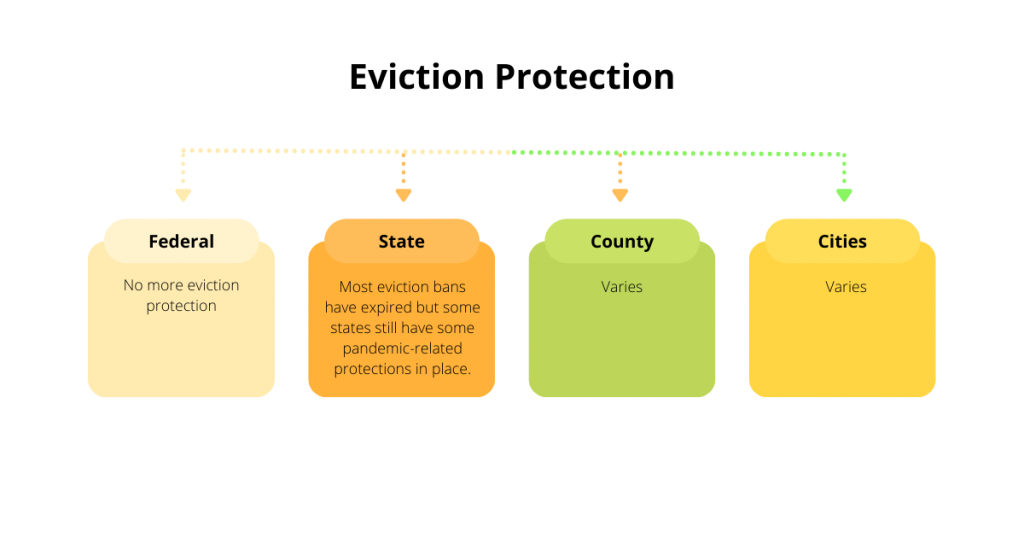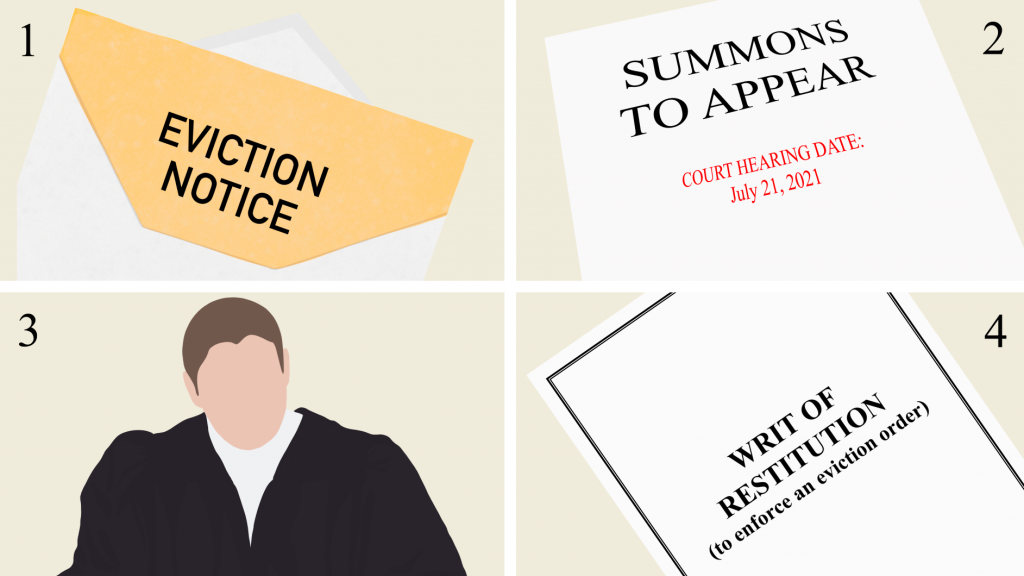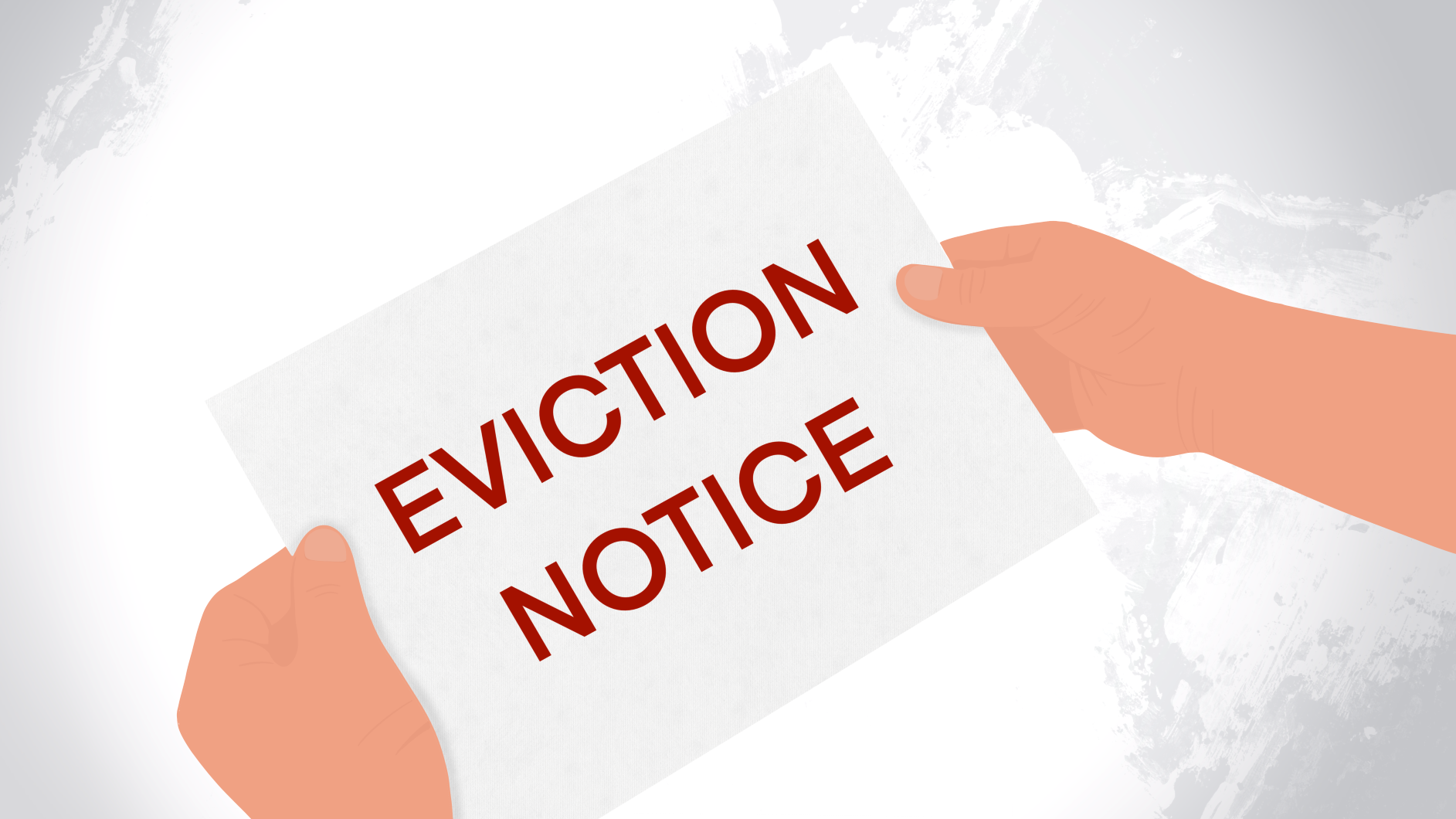One of the most critical impacts of the COVID-19 pandemic has been the mounting rent debt and the record number of households at risk of eviction. As of December 2021, more than $16 billion in rent has not been accounted for, and 5.9 million households are currently behind on rent.
Federal pandemic protections that banned landlords from evicting tenants due to unpaid rent have come and gone. Most state and local protections have expired as well. With many landlords now legally able to evict tenants, it’s important to understand the eviction process and the landlord-tenant laws that govern the rights and obligations of both parties.
While each state determines its own eviction rules, they often cover similar ground. This post addresses the general procedure that a landlord has to follow in order to lawfully evict a tenant, what tenants can do to contest, and more.
Table of Contents
- What is Eviction?
- How Does Eviction Work?
- How Long Does the Eviction Process Take?
- How Long Does an Eviction Stay On Your Record?
- How to Get an Eviction Off Your Record
- Landlord Tenant Laws
- How to Negotiate With Your Landlord
- Eviction Attorney: How to Find Legal Representation
- How to Apply for Rent Assistance
What is Eviction?
Eviction is a legal process initiated by a landlord to remove a tenant from a rental property. It is usually in response to some violation of the lease, such as nonpayment of rent, illegal activity, or having a pet in spite of a “no pet” clause in the agreement.
Is There Still an Eviction Moratorium?

With nearly 15 million people behind on rent at the height of the COVID-19 pandemic, the Center for Disease Control (CDC) enacted a nationwide moratorium in September 2020, banning landlords from evicting any tenant who is unable to pay rent due to financial hardship caused by the pandemic. The moratorium was extended three more times until the U.S. Supreme Court ruled that no more administrative extensions were permitted, ending the order in August 2021.
At this point, there is no indication from the federal government that another eviction moratorium will be enacted, but you may still have options:
-
- State and local jurisdictions adopted their own versions of the eviction moratorium in response to record unemployment and billions of dollars accrued in rent debt as a result of the pandemic. While most states’ eviction bans have expired as of January 2022, states such as, Connecticut, Massachusetts, and Oregon are restricting landlords from evicting tenants if they have a rent relief application in review.
- Certain local jurisdictions, such as Los Angeles County, have extended the eviction moratorium until the end of 2022, which means that landlords in the county are likely banned from evicting tenants for nonpayment of rent until 2023.
Keep in mind that some state or local eviction moratoriums require that a tenant sign a declaration indicating that the tenant has suffered financial harm due to the pandemic. This can include loss of work, increased costs like added childcare, or medical expenses associated with treatment of or recovery from a coronavirus infection. Other programs may also require a tenant to have applied for some form of rental assistance.
How Does Eviction Work?

The legal process of eviction takes place in civil court. Because eviction is governed by federal, state, and local laws, any landlord attempting to evict a tenant must comply with all the legal requirements on these levels. Below is the step-by-step breakdown of the eviction process from beginning to end.
1. Eviction Notice
Also known as a “pay or quit” notice, this formally marks the beginning of the eviction process. Once this written notice is served from the landlord, the tenant has a set number of days — ranging from three days to 30 days, depending on the state and the reason for the eviction — to pay the missed rent. If the terms are not met by the deadline, the landlord then has the right to file for an eviction suit — sometimes known as an unlawful detainer — in court.
2. Eviction Summons and Complaint
Once the landlord files an eviction suit in court, a summons and complaint will be served to the tenant. If the tenant ignores the court summons, their right to a hearing is forfeited, and a default judgment will be ruled. Typically, the tenant has five to 15 days to formally submit a written response to the complaint, depending on how the complaint was served.
3. What to Say in Court for Eviction: The Hearing
At the hearing, the judge will evaluate the presented evidence and testimony to decide whether the landlord has demonstrated a valid basis for eviction, whether the tenant has raised a legal defense to the eviction, and whether there are critical discrepancies between the accounts of the landlord and the tenant. Both parties can appeal the judge’s decision to the district court.
4. Writ of Restitution
If a judgment is made in favor of the landlord, a writ of restitution — a document that officially authorizes the eviction — will be filed and served to the tenant by a sheriff, who can enforce the eviction 72 hours after it has been posted.
How Long Does the Eviction Process Take?
Typically, it takes several weeks to several months for the eviction process to be completed. The exact timeline will vary depending on the reason for eviction, the local jurisdiction where the eviction is taking place, and if there are legitimate disputes to the eviction.
Depending on the location of the property, it may take considerably longer right now. Because of a buildup during the moratorium, many courts are impacted, and landlords filing an eviction may face a longer-than-usual wait until their case is actually heard.
How Long Does an Eviction Stay On Your Record?
An eviction will typically show up on the tenant’s rental history for up to seven years. While the eviction itself is not reflected in the credit report, any debt owed to the landlord after an eviction can be sold to a collections agency and impact the tenant’s credit.
Having an eviction in your rental history can negatively impact your ability to secure housing in the future. Some landlords will decline to rent to tenants who’ve been evicted in the past, even if the tenant is able to afford the unit.
How to Get an Eviction Off Your Record
The procedure for removing an eviction from your public record varies state by state. However, in most cases, the tenant may have a good chance to get it expunged if:
- The tenant can prove in court that they were wrongfully evicted due to the landlord not acting lawfully in the eviction process or that they did not break the lease agreement.
- The tenant pays off the rent debt in full and requests the collections to be removed from their credit report.
- The tenant negotiates with the landlord to have the eviction removed from tenant screening reports as a condition of debt payment.
Landlord Tenant Laws
Landlord-tenant laws determine the rights and obligations of both the landlord and the tenant signed onto a rental lease agreement. Because each state has its own version of the landlord-tenant laws, it is recommended to learn about the laws governing landlord-tenant relationships in your state.
Below are some common renter rights that can help a tenant fight off eviction. If any of these rights have been violated by the landlord, the tenant has grounds to take legal action or use the breaches as part of the defense against the eviction lawsuit.
![]()
Self-Help Eviction
Because all states require the eviction process to take place in a court of law, it is illegal for a landlord to pursue a “self-help” eviction by changing the locks, taking the tenant’s belongings, removing the front door, or turning off the heat or electricity. Even after a judgment has been ruled in favor of the landlord, it is required to retain a sheriff to do the actual eviction.
Fair Housing Rights
Under the federal Fair Housing Act, which applies in every state, landlords cannot discriminate against tenants based on race, color, national origin, religion, sex, family status, or disability. In fact, if a tenant has a physical disability, the landlord must make reasonable accommodations and allow necessary modifications.
Safe, Habitable Home
One of the most primary tenant rights is the right to a safe, habitable home. That means that a landlord is required by law to make any necessary repairs in a timely fashion and make sure the tenant’s health is not endangered by their negligence.
Privacy Rights and Security Deposit
A landlord cannot come into a tenant’s home without notice. State law also determines how long a landlord has to return the security deposit and often requires written documentation about damages if not all of the deposit is returned.
How to Negotiate With Your Landlord
If you are worried about being evicted, communication is key. It may be effective to explain the situation before back rent piles up and mutually agree on a repayment plan. If a feasible agreement cannot be reached or there are other factors in play, low-cost mediation services are available at local eviction resource centers.
Eviction Attorney: How to Find Legal Assistance
Because eviction takes place in civil court, the tenant is responsible for finding their own legal representation. Finding an eviction attorney can help ensure that the judge hears a well-crafted defense argument on the tenant’s behalf.
It may also be a helpful preemptive measure to get professional legal advice and learn about which exact landlord-tenant laws applies to the particular situation.
Even if cost is a concern, legal assistance can still be accessible. There are more than 100 nonprofit legal aid organizations across the country that provide free or discounted civil services for low-income individuals. Find an organization near you to get connected with an attorney that can provide legal assistance for eviction.
How to Find Rent Assistance
As the pandemic continues, state and local jurisdictions are responsible for distributing billions of dollars to help renters and landlords keep up with rent and pay their bills. That means that emergency rental assistance is often available at the state, county, and city levels for qualifying households.
Find government-funded rental assistance programs in your area. Non-government rental assistance may be available in your area as well.
Who Qualifies For Rent Assistance?
Federal law requires local jurisdictions to provide pandemic emergency rental assistance to households with an income below 80% of the area’s median income. It also requires that priority must be given to applications for renter households with an income below 50% of the area’s median income and households with someone unemployed for at least 90 days.
In addition to household income, these following statements must be true:
- At least one member of the household has qualified or should qualify for unemployment, lost income, owed large expenses, or had other financial hardships.
- At least one member of the household is experiencing housing instability, meaning they are at risk of homelessness or would have trouble finding a stable place to live
What Can Emergency Rental Assistance Be Used For?
Funds from emergency rental assistance can be used to cover rent, utilities, home energy costs, as well as late fees, internet, and moving-related expenses for households that must find a new home.
